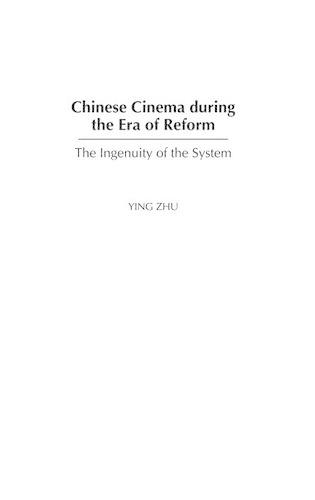
Chinese Cinema during the Era of Reform: The Ingenuity of the System
(Hardback)
Publishing Details
Chinese Cinema during the Era of Reform: The Ingenuity of the System
By (Author) Ying Zhu
Bloomsbury Publishing PLC
Praeger Publishers Inc
30th August 2003
United States
Classifications
General
Non Fiction
384.80951
Physical Properties
Hardback
248
Description
The political economy and culture of Chinese cinema during the era of China's prolonged economic reform has not until now been examined in detail. Ying Zhu's new and comprehensive study examines the institutional as well as the stylistic transitions of Chinese cinema from pedagogy to art to commerce, focusing on the key film reform measures as well as the metamorphosis of Chinese Fifth Generation films from art film narration-as in Chen Kaige's 1984 Yellow Earth-to post-New-Wave classical film narration-as in the same director's 1993 Farewell, My Concubine. Zhu's work reconciles the stylistic, cultural, and economic dimensions of the nation's cinematic output, also providing the first systematic institutional analysis of an industry in a state of constant flux.
Reviews
"A necessary book that is certain to provoke controversy. Sweeping in its understanding of the Chinese film industry and its transformation."-Zhang Junzhao director of One and Eight
"A timely book addressing pressing issues facing the Chinese film industry. Worth a close look."-Zhang Yimou Director, Raise the Red Lantern
"Brings the Chinese film industry to life. A virtuoso interpretation of the struggles of Chinese filmmakers to find their voice as State subsidies collapsed and market demands emerged. Deserves the attention not just of academic specialists but all who have an interest in film and where the global film community is going."-Zhao Baohua Editor-in-chief of the Chinese trade magazine Film
[P]rovides ample evidence for a reperiodization of post-1976 Chinese film production according to changes in the institutional and political economic structure of filmmaking. As such, it emphasizes market-oriented reforms within China's domestic industries as the overarching "generative mechanism" responsible for the undeniable status of most contemporary Chinese cinema as a form of commercial entertainment....[p]rovides a solid foundation for further inquiry into the relations between social and cultural form, revising several cherished assumptions concerning China's best-known filmmakers in the process.-Journal of Third World Studies
Well informed by current cultural theories in the West, Zhu is able to share her insights into China's film industry during the past two decades in a way that is interesting not only to film scholars and specialists but also those generalists looking for ways to engage modern Chinese culture of the last century....Having been aquainted with the interlocking relationships among film economy, film production, film art, film criticism, and film history, the reader is left to marvel at the bewildering mosaic of postmodernismm in its truest and most dynamic forms.-The Journal of Asian Studies
"Provides ample evidence for a reperiodization of post-1976 Chinese film production according to changes in the institutional and political economic structure of filmmaking. As such, it emphasizes market-oriented reforms within China's domestic industries as the overarching "generative mechanism" responsible for the undeniable status of most contemporary Chinese cinema as a form of commercial entertainment....provides a solid foundation for further inquiry into the relations between social and cultural form, revising several cherished assumptions concerning China's best-known filmmakers in the process."-Journal of Third World Studies
"[P]rovides ample evidence for a reperiodization of post-1976 Chinese film production according to changes in the institutional and political economic structure of filmmaking. As such, it emphasizes market-oriented reforms within China's domestic industries as the overarching "generative mechanism" responsible for the undeniable status of most contemporary Chinese cinema as a form of commercial entertainment....[p]rovides a solid foundation for further inquiry into the relations between social and cultural form, revising several cherished assumptions concerning China's best-known filmmakers in the process."-Journal of Third World Studies
"Well informed by current cultural theories in the West, Zhu is able to share her insights into China's film industry during the past two decades in a way that is interesting not only to film scholars and specialists but also those generalists looking for ways to engage modern Chinese culture of the last century....Having been aquainted with the interlocking relationships among film economy, film production, film art, film criticism, and film history, the reader is left to marvel at the bewildering mosaic of postmodernismm in its truest and most dynamic forms."-The Journal of Asian Studies
Author Bio
YING ZHU is Assistant Professor of Media Culture at the College of Staten Island, City University of New York.
